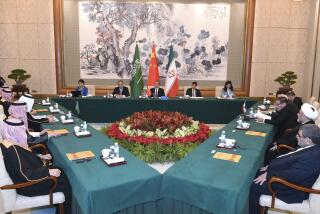OUTLOOK / NEW ARAB NATION : Yemen Could Play Strategic Role : Separately, they were among the world’s poorest nations. Together, they may alter the area’s balance of power.
- Share via
CAIRO — With the hoisting of a common red-white-and-black flag over two former capitals this week, the reunification of the Republic of Yemen closed the book on Marxism in the Middle East and signaled the emergence of a potentially important new political power on the Arabian peninsula.
Separately, Western-oriented Yemen and its Marxist neighbor, South Yemen, were two of the poorest nations in the world, deeply divided by politics, religion and historic tribal disputes.
Together, they reclaim the ancient domain of the Queen of Sheba that was historic Yemen. And, emerging as the most populous country in the Arabian peninsula and sitting on a newly discovered wealth of untapped oil reserves, they stand to play an important strategic role throughout the Red Sea region.
Regional Impact
“In terms of the regional powers in the Arabian Peninsula and the (Persian) Gulf, the balance will be changed,” Egyptian political scientist Hassan abu Taleb said. “It doesn’t mean that the unified state of Yemen will be a regional superpower. It does mean it will be a respectable military power that will have to be dealt with.”
Political analysts say a new, unified Yemen is likely to stabilize relations between the Arab world and Ethiopia; provide stronger military and political muscle for its allies in Iraq, Egypt and Jordan, and give new impetus to democratic political reforms throughout the gulf.
As such, it provides a new challenge for Saudi Arabia, which has enjoyed unquestioned dominance throughout the region for years. While Yemen cannot begin to challenge Saudi Arabia as an economic or political power broker, its military troop strength since unification has jumped from sixth in the region to second--on Saudi Arabia’s heels.
The Saudis have officially endorsed the union, although they reportedly harbor nagging doubts. They are said to be uneasy about the new Yemen’s membership in the Arab Cooperation Council with Egypt, Jordan and Iraq--particularly because non-Communist Yemen, unlike Egypt, has in recent months heeded Iraq’s calls to turn the council into a military alliance.
The result leaves Saudi Arabia virtually surrounded by a league of countries with which its relations have in the past been cordial but occasionally cool--and sometimes, as in the case of an historic border dispute with Yemen, thoroughly belligerent.
“There is some kind of feeling in Saudi Arabia that the unification of Yemen may reopen the story of this border dispute,” one Arab diplomat said.
Finally, there is the new Yemen’s strategic location to consider: at a point dominating the Bab al Mandab strait, the gateway to the Red Sea, through which two-thirds of Saudi oil passes.
Political Effects
The Saudis and other traditional ruling families of the gulf also are looking askance at the democratic reforms built into the new Yemen’s draft constitution--especially at a time when neighboring Kuwait is moving to restore its Parliament.
“When you see the democratization of the whole state of Yemen, it can’t help but scare Saudi Arabia,” Abu Taleb said.
The unification, now in a 30-month transition period, marks the demise of the Arab world’s only experiment in Marxism, in South Yemen.
The other Yemen had taken assistance wherever it could find it--from the Soviets as well as from China and the West--but it is clear that the political orientation of the new Yemen will be toward the West.
Social Conflicts
Less clear is how the deep social divisions between the two countries will be resolved. Yemen has been a conservative, rather tribal society with strong Islamic traditions. Religious fundamentalists there have been suspicious of their secular neighbor to the south, where alcohol is served in restaurants and women are unveiled--and have some of the most liberal marriage and divorce laws in the Arab world.
The chief opponents of this week’s unification vote in non-Communist Yemen were 28 members of the Muslim Brotherhood. They are alarmed that the new draft constitution, due to be confirmed by referendum Nov. 30, establishes Islamic sharia law as only one basis for the laws of the land.
Nonetheless, throughout Yemen this week, there appeared but few signs of the likely trouble ahead before elections can be held, probably at the end of 1992.
Thronging the streets of Aden to celebrate reunification, thousands of Yemenis carried banners proclaiming “Yemeni Unity Is an Immortal Victory for Democracy, Development and Freedom.” Another banner declared simply: “Unity Is Power.”
More to Read
Sign up for Essential California
The most important California stories and recommendations in your inbox every morning.
You may occasionally receive promotional content from the Los Angeles Times.













